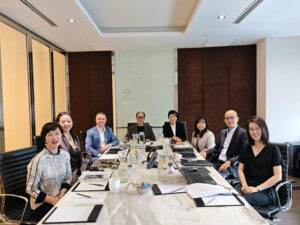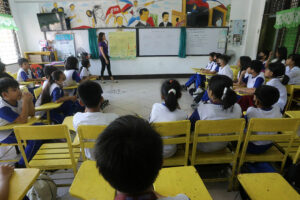It may look as though the average Filipino is preoccupied with purely political issues, those that are happening to the country’s top officials, their clashing interests, and very public fights. As we write, there is still uncertainty on whether the impeachment trial of Vice-President Sara Duterte will even push through, given how much it has already been delayed.
Some senator-judges appear more guided by partisan instincts than by the demands of impartial adjudication. Their public declarations hint at conclusions reached well before the Senate, acting as an impeachment court, has had the opportunity to weigh the evidence.
These dynamics matter — not just as political spectacle, but as indicators of how governance and the rule of law are treated in practice. Whether it’s the sympathy stirred by the former president’s detention in The Hague, or the wave of propaganda and disinformation shaping public sentiment, the stakes are high. At the core is a longstanding crisis of accountability, especially around the misuse of public funds — a pattern of corruption that continues to stall the country’s progress.
In the end, however, the average Filipino’s most urgent national concerns are economic in nature.
The latest Pulse Asia survey, conducted from June 26 to 30, showed that 62% of Filipinos believe that controlling inflation is the most urgent concern. Fifty-one percent are concerned with increasing workers’ pay. Other pressing concerns include reducing poverty (26%), creating more jobs (25%), and fighting graft and corruption in government (24%).
It is not surprising, then, that the Consumer Expectations Survey of the Bangko Sentral ng Pilipinas (BSP) — which captures the economic outlook of consumers as an indication of the country’s future economic conditions — showed that consumer sentiment also weakened during the second quarter of this year. The overall consumer confidence index dropped to -14% from -13% in the previous quarter. This more pessimistic outlook was driven by concerns over rising inflation, declining household income, fewer job opportunities, and uncertainties in the delivery of government services amid increasing political tensions.
Meanwhile, the BSP’s Business Expectations Survey generates indications of overall business sentiment and prospects/outlook. This figure also reflected a decline in confidence during the second quarter. The confidence index (CI) fell to 28.8% from 31.2% in the first quarter.
Businesses cited factors such as the potential economic impact of a temporarily paused 17% reciprocal tariff on Philippine exports to the US — now reverted to 10% — as well as anticipated lower demand following the midterm elections and the sugar milling off-season.
We take note of these figures just days before the State of the Nation Address of President Ferdinand Marcos, Jr. As he speaks in front of his national constituency, the President must be all too aware that the urgency of these economic concerns trump other issues for the common Filipino. With three years behind him and another three years to go before the end of his term, President Marcos must focus on the more daunting task at hand — to address inflation, low wages, poverty, and unemployment, but also without losing sight of efforts to curb corruption which funnels precious public funds that could be used for the people.
A recent Pulse Asia survey would help assure the administration that it is on the right path, as it reveals significant improvements in public approval of the national administration’s handling of key issues. Approval ratings rose notably in areas such as job creation (+18%), fighting criminality (+15%), and addressing hunger (+13%). Even on the continuing issue of inflation control, approval increased by 15%, suggesting progress on public perception in managing price stability.
These gains affirm the effectiveness of the Marcos Jr. administration’s initiatives in prioritizing the improvement of the Filipino people’s lives by ensuring that their top concerns are addressed. The upward trend in approval across multiple sectors reflects growing recognition of government efforts to improve economic and social conditions — crucial as the administration navigates its remaining years in office.
But what these gains highlight, most of all, is that it takes time before any real action on various aspects of the economy can be felt by businesses and consumers alike. Thus, the administration must ensure that its efforts are sustained and consistent, unhampered by any fleeting political headwinds that may come. It will take time before any meaningful reform is truly felt and before it can inspire confidence that better times are coming despite challenges.
As the administration begins the second half of its term, consistent policy direction, timely implementation of government programs, and enhanced support for key sectors are non-negotiable steps to take. Our leaders need to ensure that mitigation efforts are in place to cushion potential economic headwinds, including contingency measures to support affected sectors, sustain employment, and maintain overall market stability.
All these are vital to maintaining investor interest, stimulating economic activity, and ensuring that benefits and changes are not only recorded on paper but felt by ordinary Filipinos.
If the administration does not lose sight of these goals for the remainder of its term, reality would align more with people’s expectations, and Filipinos would get the quality of life that they deserve.
Victor Andres “Dindo” C. Manhit is the president of the Stratbase ADR Institute.






